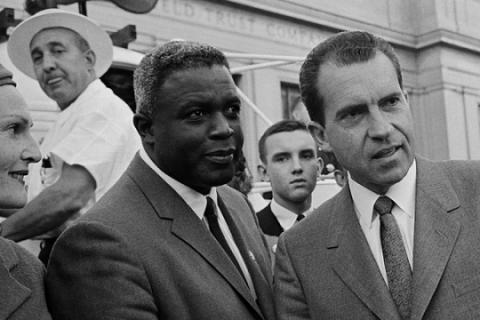Why Jackie Robinson Still Matters
TIME IDEAS
April 10, 2012
by Doug Glanville
Sixty-five years after he crossed the color line, his contributions to sport and to the U.S. are undiminished.
Until April 15, 1947, blacks in America had been paying taxes, fighting in wars and voting for decades. But they had not yet stepped into the arena of one of the most American of institutions: Major League Baseball. On that day, Jackie Robinson crossed the color line to play for the Brooklyn Dodgers in their season-opening game against the Boston Braves at Ebbets Field. This week marks the 65th anniversary of that event and is as good an occasion as any to explore why it still matters.
Five months later, in the Sept. 22, 1947, issue, TIME recognized Robinson’s near impossible rise to prominence by honoring him on its cover. By then he had been the recipient of the inaugural Rookie of the Year honor from the Sporting News, which made the choice on the basis of “stark baseball values,” and TIME was also careful to recognize Robinson primarily for his adept on-field abilities as a first-year player.
TIME portrayed Robinson as all-American before it was accepted that he could be. The article noted that “he did not smoke (his mother had asthma and cigaret fumes bothered her); he drank a quart of milk a day and didn’t touch liquor; he rarely swore; he had a service record (as Army lieutenant in the 27th Cavalry) and two years of college (at UCLA). He had intelligence, patience and willingness. He was aware of the handicaps his race encounters, but he showed it not by truculence or bitterness, and not by servility, but by a reserve that no white man really ever penetrated. Most important of all Robinson’s qualifications, he was a natural athlete.”
Robinson was also a team player who at one point admonished his mother by telling her, “Quit praying just for me alone, Ma, and pray for the whole team.” He had a sense for what was bigger than him, even as his nerves were frayed from internalizing the stress.
He took that spectacular will and continued it well beyond his playing career, challenging Presidents, civil rights leaders and history itself. By the time of his death from diabetes in 1972, Robinson’s mark had been made, not only by his coming in and doing well but also by doing well with honor. America found a jewel in Robinson at the right time, and the country needed to look no further than those who had believed in its future long before they could even see one that was fair and inclusive. In 1955, eight years after Robinson’s first season, the Brooklyn Dodgers finally won the World Series. But it was not until the passage of the Voting Rights Act of 1965 that he had the legal protections to vote without the discriminatory practices that had plagued black citizens before that time. By then, Robinson had set a new bar for American entrepreneurship and social consciousness, from his executive role at Chock full o’Nuts to his passionate dialogue with civil rights leaders to his correspondence with Presidents Kennedy and Nixon about the need to end discrimination. He was a great citizen, but more important, he was an involved ambassador for baseball and for social equality. He fought with every ounce of his body for change he believed in.
Republished from TIME Ideas






